-
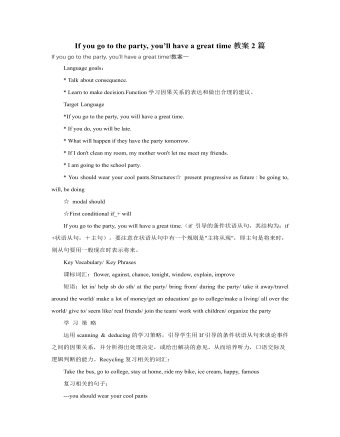
人教版新目标初中英语八年级下册If you go to the party, you’ll have a great time教案2篇
区分宾语从句、定于从句和状语从句宾语从句和状语从句,都叫做主从复合句。宾语从句主要是中考必考的,是初中阶段必掌握的从句,宾语从句主要是掌握三要素,所谓宾语从句,就是宾语在主从复合句当中充当宾语的一个句子,叫做宾语从句。主句的谓语动词是及物动词,后面如果是词或者是短语的话,是简单句,如果是句子的话,肯定是宾语从句。I know that he good at English.就是宾语从句,三要素,一要素是要注意连词,连词一共学了三类连词,一类连词是that口语当中可以省略,就像刚才说的那一句,I hear he is good at English.还有疑问代词、疑问副词,how where when,疑问代词、疑问副词。还有一类连词weather是否的意思,不是状语从句当中的如果,这一定要和如果区分开,这是是否。I don't know if he interested at English。宾语从句要注意if是连词。第二要素是语序,要用陈述举语序。比如说你家有几口人,我们都说How many people are there in you family?但是这是简单句,一旦说成宾语从句,你可以告诉我你家有几口人吗?Could you tell me how many people there are in you family ?
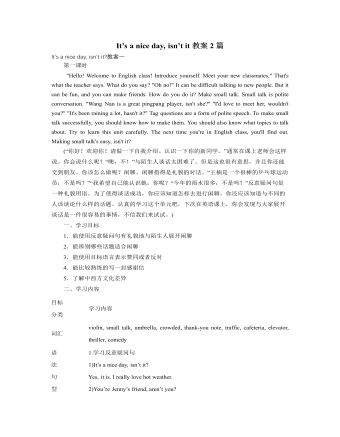
人教版新目标初中英语八年级下册It’s a nice day, isn’t it教案2篇
"Hello! Welcome to English class! Introduce yourself. Meet your new classmates." That's what the teacher says. What do you say? "Oh no!" It can be difficult talking to new people. But it can be fun, and you can make friends. How do you do it? Make small talk. Small talk is polite conversation. "Wang Nan is a great pingpang player, isn't she?" "I'd love to meet her, wouldn't you?" "It's been raining a lot, hasn't it?" Tag questions are a form of polite speech. To make small talk successfully, you should know how to make them. You should also know what topics to talk about. Try to learn this unit carefully. The next time you're in English class, you'll find out. Making small talk's easy, isn't it? (“你好!欢迎你!请做一下自我介绍。认识一下你的新同学。”通常在课上老师会这样说。你会说什么呢?“噢,不!”与陌生人谈话太困难了。但是这也很有意思,并且你还能交到朋友。你该怎么做呢?闲聊。闲聊指得是礼貌的对话。“王楠是一个很棒的乒乓球运动员,不是吗?”“我希望自己能认识她,你呢?“今年的雨水很多,不是吗?”反意疑问句是一种礼貌用语。为了使得谈话成功,你应该知道怎样去进行闲聊。你还应该知道与不同的人该谈论什么样的话题。认真的学习这个单元吧,下次在英语课上,你会发现与大家展开谈话是一件很容易的事情,不信我们来试试。)
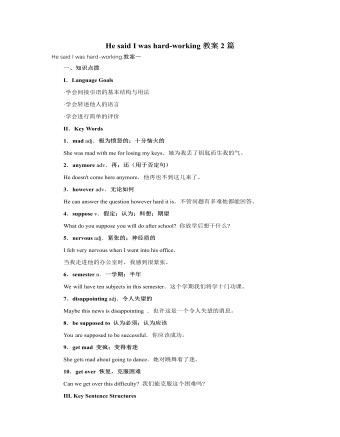
人教版新目标初中英语八年级下册He said I was hard-working教案2篇
This activity introduces some new vocabulary and provide oral practice using the target language.Task 1 . Ask four students to stand in front of the class, and the teacher asks them the following questions as a reporter.1.What are you going to do when you grow up?2.What are you going to do next week?3.What are going to do after school?The students will give different answers, then ask a good student to report what they said.I am going to e a doctor.What did she say?----------She said she was going to be a doctor.I am going to have a party on Friday night.What did he say?-------He said he was going to have a party on Friday night.I am going to do my homework.What did she say ?------ She said she was going to do her homework.I am going home after school.What did she say?-----She said she was going home after school.Say In this unit we are going to learn to use words like to report what someone said.Task 2. Read the instructions. Then ask a student to read the four questions. And write the words on the Bb. Explain what soap opera is.Task 3. Ask the students to Look at the pictures, point out the TV screens in the picture. Ask one girl to read what Marcia said.What did Marcia say? She said She said she was having a surprise party for Lana on Friday night. Repeat the other pictures in the same way.Activity3. Listen and number the pictures in activity 1a.
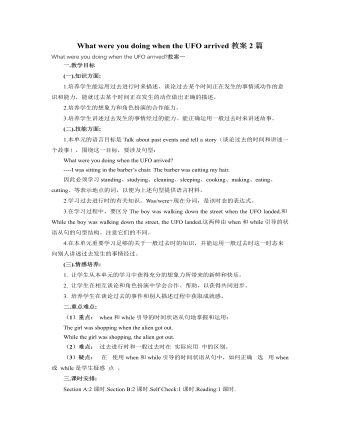
人教版新目标初中英语八年级下册What were you doing when the UFO arrived教案2篇
(一).知识方面: 1.培养学生能运用过去进行时来描述、谈论过去某个时间正在发生的事情或动作的意识和能力,能就过去某个时间正在发生的动作做出正确的描述。 2.培养学生的想象力和角色扮演的合作能力。 3.培养学生讲述过去发生的事情经过的能力。能正确运用一般过去时来讲述故事。 (二).技能方面: 1.本单元的语言目标是Talk about past events and tell a story(谈论过去的时间和讲述一个故事),围绕这一目标,要涉及句型: What were you doing when the UFO arrived? ----I was sitting in the barber’s chair. The barber was cutting my hair. 因此必须学习standing、studying、cleaning、sleeping、cooking、making、eating、cutting、等表示地点的词,以便为上述句型提供语言材料。2.学习过去进行时的有关知识。Was/were+现在分词,是该时态的表达式。 3.在学习过程中,要区分The boy was walking down the street when the UFO landed.和While the boy was walking down the street, the UFO landed.这两种由when和while引导的状语从句的句型结构。注意它们的不同。
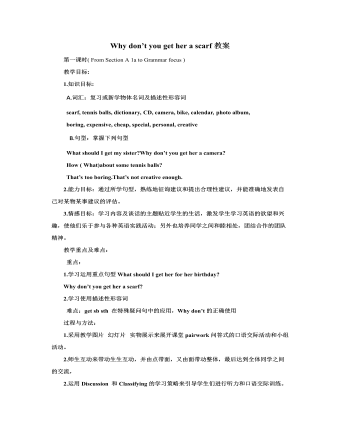
人教版新目标初中英语八年级下册Why don’t you get her a scarf教案
教师带领学生复习有关描述宠物的词汇,采用教师提问学生回答的方进行。如:T:What animals do you think would be good pets?What animals do you think would be bad pets?What do you think are good animals for a six-year-old child?然后学生进行 pairwork 练习。Task two: 师生互动,学习探究 1、播放3a部分的录音,引导学生一边听录音,一边跟读。2、通过听录音学生回答以下问题:Why do you think pot-bellied pigs are popular?What are the advantages and disadvantages of keeping such a pet?教师对学生的回答进行及时点评。3.学习范文,学习重点短语,为下步的模仿写作提供语言素材。T :1. )Have you ever kept a pig as a pet?Do you like pigs? St.:No.…Why don’t you like to keep a pig? St: No.They’re too dirty and lazy(Do you know in some foreign countries like Hollyland, Australia,pigs are the most popular pet.there’s a kind of pig.(图)it has an interesting name? it ‘s called a pot-bellied pig.) Now,let’s learn an article about this kind of interesting pet.2.)play the tapeSt.:Listen and repeat3.)show some Qs on computer(本子St.: read silently,then answerthe Qs(本子)4.)Ask ss. Close book and retell this passage.(what is a pot-bellied pig? Is it a good or bad pet? ) St.: retell it to each other“A pot –bellied pig is a popular pet now…”5.read the article together.St.:.practice reading
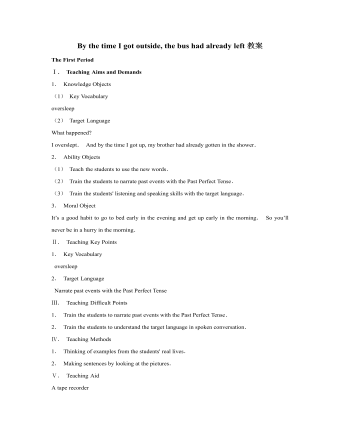
人教版新目标初中英语九年级下册By the time I got outside, the bus had already left教案
Ⅰ. Teaching Aims and Demands1. Knowledge Objects(1) Key Vocabularyoversleep(2) Target LanguageWhat happened?I overslept. And by the time I got up, my brother had already gotten in the shower.2. Ability Objects(1) Teach the students to use the new words.(2) Train the students to narrate past events with the Past Perfect Tense.(3) Train the students' listening and speaking skills with the target language.3. Moral ObjectIt’s a good habit to go to bed early in the evening and get up early in the morning. So you’ll never be in a hurry in the morning.Ⅱ. Teaching Key Points1. Key Vocabularyoversleep2. Target LanguageNarrate past events with the Past Perfect TenseⅢ. Teaching Difficult Points1. Train the students to narrate past events with the Past Perfect Tense.2. Train the students to understand the target language in spoken conversation.Ⅳ. Teaching Methods1. Thinking of examples from the students' real lives.2. Making sentences by looking at the pictures.Ⅴ. Teaching AidA tape recorderⅥ. Teaching ProceduresStep I Revision1. Revise the language points in Unit 8.Ask some questions like this: What volunteer work would you like to do?Help the students to answer, I’d like to…/I love to…/I hope to2. Practice the dialogue in Activity 3c on page 62 again. Get students to role play the similar dialogues with the following.
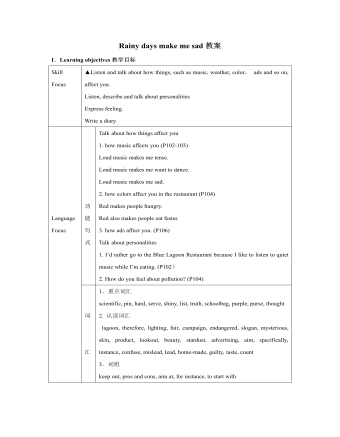
人教版新目标初中英语九年级下册Rainy days make me sad教案
1. 教材分析本单元以how do things affect you?为话题, 从颜色、天气、音乐、广告、产品等方面谈论了外界事物如何影响人的心情。要求学生掌握表达某物或某事给人带来的感觉、看法或影响等。共设计了四个部分的内容:Section A 该部分有4个模块:第一模块围绕Which restaurant would you like to go to?这一话题展开思维(1a)、听力(1b)、口语(1c)训练;第二模块围绕How does music affect you? 进行听力(2a-2b)、口语训练(2c);第三模块继续围绕how do colors in the restaurant affect you这一话题展开训练,训练形式为阅读和问题体验(3a)和小组活动(3b);第四模块仍就How do things affect you这一话题以调查的形式展开讨论。Section B该部分有4个模块:第一模块围绕产品广告对人们的影响这一话题以“配对”(1a)与“列举”(1b)两种形式展开训练;第二模块继续围绕How do things affect you? 进行听力(2a-2b)、口语对话训练(2c);第三模块围绕“Advertising”这一话题展开阅读(3a-3b)和写作(3c)训练;第四模块围绕How posters affect you这一话题以口语训练形式展开小组活动。
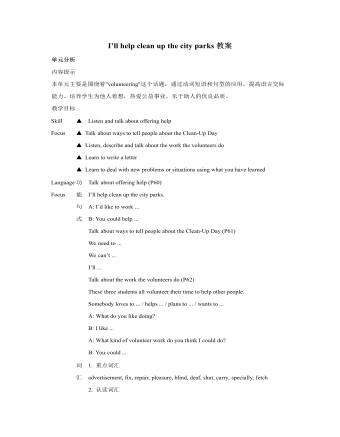
人教版新目标初中英语九年级下册I’ll help clean up the city parks教案
Talk about offering help (P60)I’ll help clean up the city parks.A: I’d like to work ...B: You could help ...Talk about ways to tell people about the Clean-Up Day (P61)We need to ...We can’t ...I’ll ...Talk about the work the volunteers do (P62)These three students all volunteer their time to help other people.Somebody loves to ... / helps ... / plans to ... / wants to ...A: What do you like doing?B: I like ... A: What kind of volunteer work do you think I could do?B: You could ...1. 重点词汇advertisement, fix, repair, pleasure, blind, deaf, shut, carry, specially, fetch2. 认读词汇hunger, homeless, cheer, clean-up, sign, establish, major, commitment, elementary, veterinarian, coach, similar, call-in, strategy, disabled, organization, unable, support, appreciate, donation, part of speech, pronoun, adverb, preposition, conjunction, donate, Jimmy, Sally3. 词组clean up, cheer up, give out, put off, set up, think up, take after, fix up, give away, put up, hand out, work out, at once

蓝黄色英语教师英文简历
Major in:Chinese, mathematics,foreign languages, history, ideology and politics, geography, chemistry,physics, biologyEnglishmajor, undergraduate, majoring in: English intensive reading, English extensivereading, English listening, English grammar, oral English, English writingEducationmajor, graduate student, major in: introduction to education, generalpsychology, developmental psychology, educational psychology
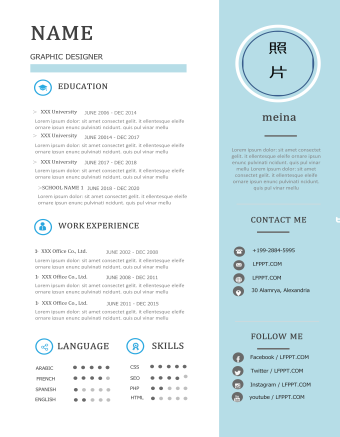
清新英文简历模板
Lorem ipsum dolor: sit ametconsectet gelit. it ellentesque eleife ornare ipsun enunc pulvinati ncidunt.quis pul vinar mellu Lorem ipsum dolor: sit amet consectet gelit. itellentesque eleife ornare ipsun enunc pulvinati ncidunt. quis pul vinar mellu。Loremipsum dolor: sit amet consectet gelit. it ellentesque eleife ornare ipsun enuncpulvinati ncidunt. quis pul vinar mellu.
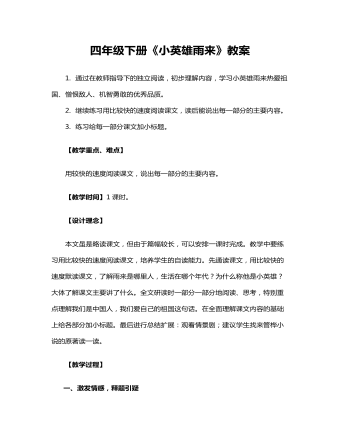
四年级下册《小英雄雨来》教案
1. 通过在教师指导下的独立阅读,初步理解内容,学习小英雄雨来热爱祖国、憎恨敌人、机智勇敢的优秀品质。2. 继续练习用比较快的速度阅读课文,读后能说出每一部分的主要内容。3. 练习给每一部分课文加小标题。【教学重点、难点】用较快的速度阅读课文,说出每一部分的主要内容。【教学时间】1课时。【设计理念】本文虽是略读课文,但由于篇幅较长,可以安排一课时完成。教学中要练习用比较快的速度阅读课文,培养学生的自读能力。先通读课文,用比较快的速度默读课文,了解雨来是哪里人,生活在哪个年代?为什么称他是小英雄?大体了解课文主要讲了什么。全文研读时一部分一部分地阅读、思考,特别重点理解我们是中国人,我们爱自己的祖国这句话。在全面理解课文内容的基础上给各部分加小标题。最后进行总结扩展:观看情景剧;建议学生找来管桦小说的原著读一读。【教学过程】一、激发情感,释题引疑1、课件演示:小雨来与鬼子斗争的片断。问:你们想认识这位小英雄吗?2、出示课题:(1) 理解课题:齐读课题你从中知道了什么?小——指的是雨来的年龄小,是一个少年。英雄——指的“是雨来的特点。雨来——课文中的主人公。课题表现出文章的中心——英雄。(2) 引导到学生质疑:看到课题后,你还想知道什么?(为什么称雨来是小英雄?)(从课文中的哪些地方可以看出雨来是一位小英雄?)
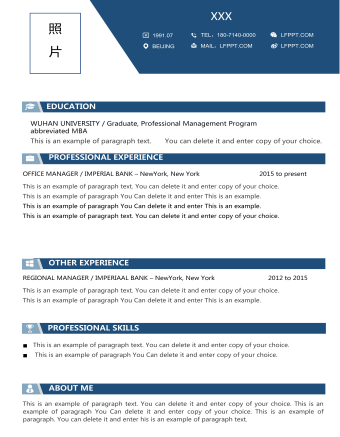
个人求职英文简历模板
OFFICE MANAGER / IMPERIAL BANK – NewYork, NewYork 2015 to presentThis is an example of paragraph text. You can delete it and enter copyof your choice. This is an example of paragraph You Can delete it and enter This is anexample. This is anexample of paragraph You Can delete it and enter This is an example. This is anexample of paragraph text. You can delete it and enter copy of your choice.
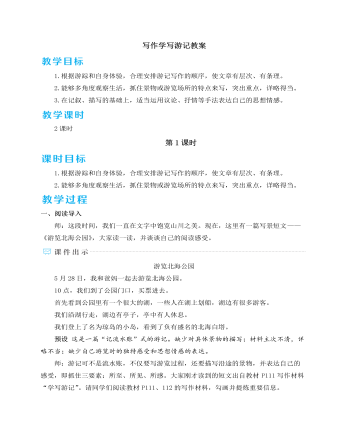
人教部编版语文八年级下册写作学写游记教案
4.组织材料师:一篇游记作品,既要有“灵魂”“血肉”,还得有“筋骨”——材料安排。请大家运用我们上节课学习的方法来组织材料。方法:(1)按照自己的游踪或独特体验,安排写作顺序。(2)能突出参观场所特征的要详写,其余的略写或不写。(3)丰富文章内容:适当加入叙事,引入一些典故、传说、史料、评价或诗文名句。示例:(1)写作顺序:以作者的参观路线为线索。(2)详略安排:详写鲁迅先生北京故居的工作室兼卧室,以突出鲁迅简朴、惜时的品质和忘我工作的精神品质;详写陈列大厅是为了赞扬先生的民族精神。其余的略写。(3)引入内容:引用古诗句“望崦嵫而勿迫,恐鹈之先鸣”,表现先生惜时的品质。(生交流,师点评)预设 (1)写作顺序:一楼的青铜器—二楼的陶器—三楼的古代画作。
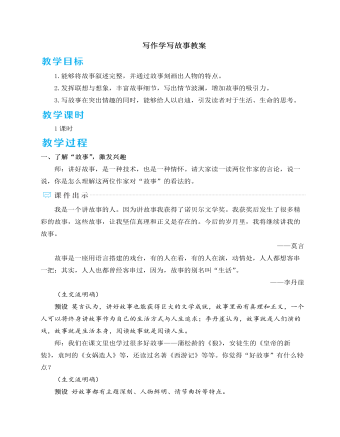
人教部编版语文八年级下册写作学写故事教案
师小结:《投诉母亲》中,“我”想让母亲辞职享清福,尽人子之孝心。没料到通往目标的路上障碍重重,解决一个障碍,又有一个新的障碍横在眼前,就这样一个个障碍将故事的矛盾冲突推向高潮。从让母亲辞职到放弃计划,顺从母亲,让故事有了戏剧性的收尾。这是运用了巧设障碍法让情节跌宕起伏。《错误的手套》中,母亲说“给孩子买副手套”,本意是让父亲给小外孙买手套,父亲却给女儿买了副手套,作者巧用语言的模糊性,使故事一波三折、情真意切。这是运用了巧设误会法让情节跌宕起伏。技法3:用巧设障碍法、巧设误会法写“情节曲折的故事”。4.归纳整合,明确技法师:共赏“好故事”,我们发现了三个技法。技法1:用“以小见大”的手法写“主题深刻的故事”。技法2:用对比手法写“人物鲜明的故事”。(1)通过人物在不同情境中的对比来突出人物性格特点。(2)通过人物之间的差异对比来突出人物特征。技法3:用巧设障碍法、巧设误会法写“情节曲折的故事”。
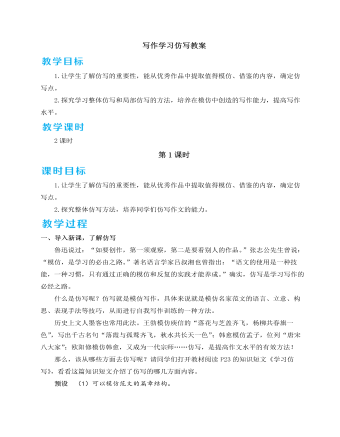
人教部编版语文八年级下册写作学习仿写教案
3.教师小结(1)仿写点分析。要认真分析、研究片段中的精彩之处,力求准确把握仿文的“外形”和“神韵”。 (2)仿写内容选择。选择自己熟悉的、有情感体验的内容,切不可为了“仿”而机械模仿甚至抄袭。(3)变通与创新。 分析名家名作的语言特点、写法规律,以“仿写”为阶梯、桥梁,达到写作的新高度、新领域。【设计意图】学生在阅读教学和句式仿写训练中对修辞手法、描写手法和表达方式等知识接触较多,如《社戏》教学中对心理描写手法的分析,《安塞腰鼓》课后布置的修辞手法的仿写训练,学生对此已有亲和感。本环节的主要目的在于让学生在实践中对仿写点的分析、仿写内容的选择、仿写的变通与创新产生切身的体悟。三、总结存储1.课堂小结学会根据需要恰当选择具体的、合理的仿写点,达到以“他山之石”来“攻玉”,“假名家之手”写“我心”的目的,是仿写的真正要义。2.实践演练完成课本P24“写作实践”第三题。
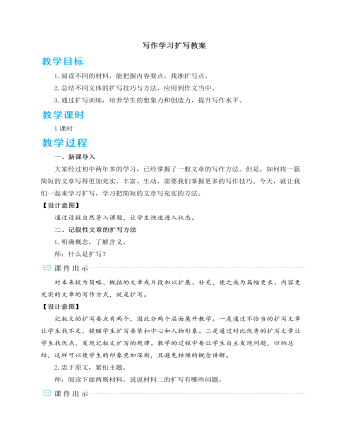
人教部编版语文九年级下册写作学习扩写教案
这一特点还着重体现在动词的应用上面,“鸟宿池边树,僧敲月下门”中的“敲”,就比“推”更能体现诗中以动衬静的特点。在字词上不断推敲,就能体会到诗歌语言高度凝练的特点。再说,古人创作古诗词,并不是写出来的,而是吟咏出来的,他们十分注重音韵在表情达意方面的作用。李清照的《声声慢》便是一个极好的例子,开头“寻寻觅觅,冷冷清清,凄凄惨惨戚戚”十四个叠字,读起来抑扬顿挫,缠绵哀婉,将李清照情绪上的失落、低沉,甚至哽咽展现得淋漓尽致。正因为诗歌的这三个鲜明特点,使得诗歌与别的文体区分开来,具有鲜明的个性。师点评:对于诗歌的扩写,要通过多种方式展现诗歌的主要特点。对诗歌的扩写练习,要求从诗歌意象、语言和节奏韵律三方面展开。首先,这篇习作从三个不同时代的诗歌总结出相同的规律——利用意象表达情感。其次,将古诗词与现代诗进行对比,展现了第二个特点。最后,以《声声慢》为例,详细分析了第三个特点。在紧密围绕诗歌特点的基础上,通过多种方法呈现了对诗歌的认识。
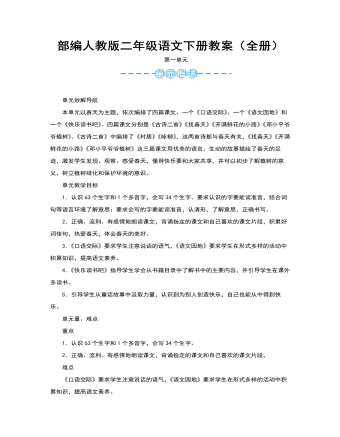
二年级语文下册教案课程全册
本文是一篇语言优美,充满儿童情趣和文学色彩的文章,仿佛呼唤着我们去寻找春天。我们到校园里找一找,也许能在操场边发现刚探出头的小草;我们到野外去找一找,也许能在天空中发现飘飘摇摇的风筝;打开课本,我们还会在课本插图中发现春天的影子;读着课文,我们会感觉自己就是那几个脱掉棉袄,冲出家门,奔向田野的孩子,我们还能体会到寻找春天的急切心情,感受到发现春天的欣喜。二年级学生具有好奇、爱探索、易受感染的心理特点,容易被新鲜的事物、活动的东西所吸引。在一年半的语文学习后,他们已经能够说一段较完整的话,并能在教师创设的情境中体验、感受,达到情感的共鸣,同时也积累了不少生活素材,这些都是学习本课的有利因素。
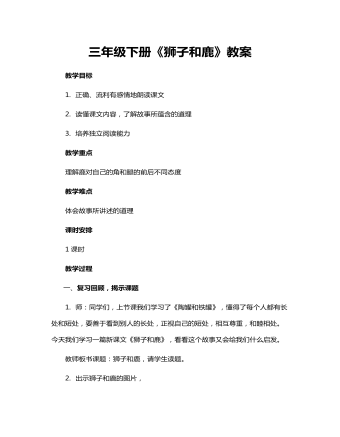
人教版三年级下册《狮子和鹿》教案
教学目标1. 正确、流利有感情地朗读课文2. 读懂课文内容,了解故事所蕴含的道理3. 培养独立阅读能力教学重点理解鹿对自己的角和腿的前后不同态度教学难点体会故事所讲述的道理课时安排1课时教学过程一、复习回顾,揭示课题1. 师:同学们,上节课我们学习了《陶罐和铁罐》,懂得了每个人都有长处和短处,要善于看到别人的长处,正视自己的短处,相互尊重,和睦相处。今天我们学习一篇新课文《狮子和鹿》,看看这个故事又会给我们什么启发。教师板书课题:狮子和鹿,请学生读题。2. 出示狮子和鹿的图片,师:看到这两种动物,联想到了什么呢?学生回答。师:狮子凶猛,鹿很美丽,这个大家都已知道。不过,这篇课文通过狮子和鹿的故事却要告诉我们一个新的道理,是什么呢?下面就看谁的读书本领强,能够自己读懂课文,领悟这个道理了。
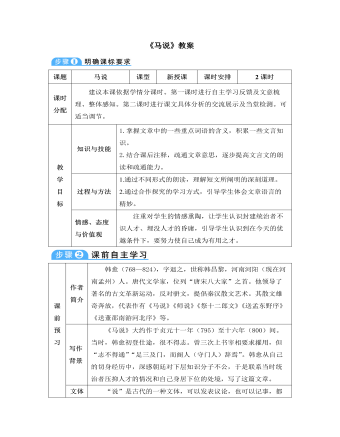
部编版语文八年级下册《马说》教案
课时分配 建议本课依据学情分课时。第一课时进行自主学习反馈及文意梳理、整体感知。第二课时进行课文具体分析的交流展示及当堂检测。可适当调节。教学目标 知识与技能 1.掌握文章中的一些重点词语的含义,积累一些文言知识。2.结合课后注释,疏通文章意思,逐步提高文言文的朗读和疏通能力。过程与方法 1.通过不同形式的朗读,理解短文所阐明的深刻道理。2.通过合作探究的学习方式,引导学生体会文章语言的精妙。情感、态度与价值观 注重对学生的情感熏陶,让学生认识封建统治者不识人才、埋没人才的昏庸,引导学生认识到在今天的优越条件下,要努力使自己成为有用之才。
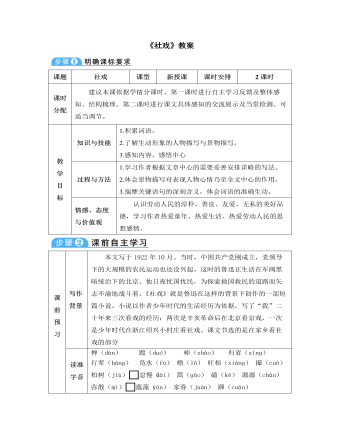
部编版语文八年级下册《社戏》教案
(3)烘托了人物怎样的心情?作者采用写意手法,从色彩、气味、声响等方面,描绘了夏夜行船、月夜归航等画面,充满了水乡特色,很好地烘托了“我”欢畅愉悦的心情,情景交融,令人难忘。【把握文章主旨】课文结尾说:“真的,一直到现在,我实在再没有吃到那夜似的好豆,——也不再看到那夜似的好戏了。”对这个结尾应该怎样理解?你在生活中有这样的体会吗?其实那夜的戏,看得叫人“打呵欠”“破口喃喃的骂”;那夜的豆,第二天吃起来也实在平常。所谓“那夜似的好豆”“那夜似的好戏”,代表了作者对天真烂漫、自由有趣的童年美好的回忆,充满一种浪漫的理想色彩,表现对人生理想境界的渴望和追求。第二问是开放性题目,同学们可根据自己的实际情况作答。





















